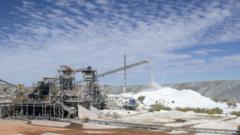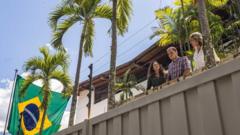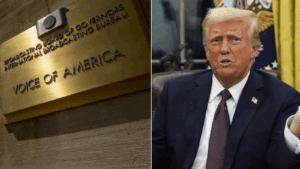Australia is stepping up its efforts to reduce reliance on China for rare earth minerals, with PM Albanese proposing a A$1.2 billion reserve. This comes as China enacts export restrictions, further intensifying trade tensions. However, challenges remain in the refining sector, which continues to be predominantly controlled by China.
Australia Bids for Rare Earth Dominance Amid China's Export Restrictions

Australia Bids for Rare Earth Dominance Amid China's Export Restrictions
As China imposes export controls on rare earth minerals vital to high-tech industries, Australia's Prime Minister Anthony Albanese reveals a strategic investment plan aimed at enhancing the country's critical mineral reserves.
Australia is preparing to increase its production of rare earth minerals as China enforces new export restrictions on critical elements essential for advanced technologies. Prime Minister Anthony Albanese recently announced a proposal to invest A$1.2 billion (£580 million) in a strategic reserve for critical minerals ahead of next month’s election. This push appears aimed at reducing the nation's reliance on Chinese supply, as trade tensions between China and the West grow.
China's controls on seven rare earth elements are seen as a direct response to tariffs imposed on Chinese imports by the Trump administration. These minerals, crucial for producing technologies such as electric vehicles and advanced defense systems, have raised concerns among Western governments due to China's dominant position in the market. Notably, analysts point out that while both Australia and China have rare earth reserves, over 90% of the mineral refining occurs in China.
Understanding the significance of rare earth minerals is critical: these elements are challenging to extract and are vital for the manufacture of numerous high-tech products, including electric vehicle batteries and military applications. Despite being a leading producer of these minerals, Australia’s refining capacity is limited compared to China’s extensive operations, which serve not just their domestic needs but also a significant portion of the global market.
Beijing claims that its export restrictions are a reaction to the US tariffs, which currently stand at 145%. As a result, US industries have become more vulnerable, with nearly 75% of rare earth imports sourced from China during 2019-2022. Furthermore, Tesla's CEO Elon Musk mentioned that China’s halting of rare earth exports is hampering their robotics development, highlighting the tangible impacts of these restrictions.
Albanese's proposal for a strategic reserve intends to strengthen Australia's resource industry and potentially supply allies such as the US and EU. However, while the move is generally welcomed, experts caution that it won’t fully resolve the issue—Australia still relies heavily on China for the refining process of rare earths.
The Australian government has begun to invest in refining processes as part of its "Future Made in Australia" plan, including funding for a new combined mine and refinery and launching its first rare earth processing plant. Still, analysts anticipate that Australia may remain dependent on China for refining until at least 2026.
In the wider context of the geopolitical landscape, China has taken the opportunity to criticize Western trade policies, urging Australia to collaborate with them, a message quickly rebuffed by Albanese. While the proposal aims to safeguard national resources against strategic rivals, analysts maintain that China retains considerable leverage due to its refining control.
This evolving situation underscores the challenges Australia faces in redefining its role in the global market of rare earths and critical minerals amidst intensifying trade dynamics and geopolitical considerations.





















